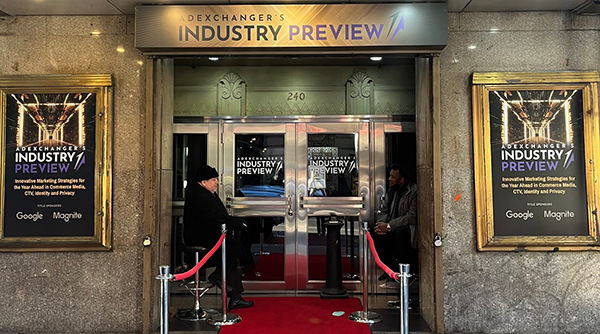 |
||||||||||||
|
||||||||||||
| Biden v. Privacy For America: The Battle Over Federal Privacy Regulations |
 |
| The federal privacy battle came to a standoff after President Biden's State of the Union address. Don't hold your breath if you're hoping the two sides are coming to common ground. President Biden reiterated his proposed restrictions for federal ad targeting regulations at the State of the Union. In response, ad industry groups supported some of the proposed legislation but announced they would oppose any rules that broadly restrict ad targeting. "Privacy legislation should distinguish between harmful practices that should be prohibited and responsible data practices like advertising that provide valuable information to consumers and are essential to innovation and economic growth," said the umbrella group Privacy for America. The ad groups are concerned that privacy regulations will further hinder their business. They want to ensure the federal government designs legislation to protect consumers from harm instead of addressing a general disdain for any use of data. "Through good-faith collaboration, we can codify important data protections for consumers while protecting valuable ad-supported content and services," said Bob Liodice, CEO of the Association of National Advertisers. "Our common goal should be to stop unreasonable and unexpected data practices while allowing beneficial practices that drive innovation, growth, and consumer benefit." |
| The industry is tired of this back-and-forth in the fight for federal privacy regulations. The ADPPA has not made any motion since the House Vote in July. Although state regulations are making headway, federal legislation has remained the same. Where can the opposing sides find common ground? Based on the responses from the advertising industry, they are open to working with the government to establish federal privacy regulations. Still, they need reassurance that the laws won't harm their business. The ad industry has pushed the need for federal privacy laws since 2018 after California passed its comprehensive law. While California's law established sweeping restrictions, it still allowed companies to serve ads to consumers based on their activity across sites on an opt-out basis. The distinct difference is that the advertising industry is pushing for consumers' opt-in consent to collect their data instead of an overarching restriction of data collection. |
| Generative AI: Ad Tech’s New Digital Frontier or Traffic Disruptor? |

Image sourced from
|
| With the rapid changes in the industry, ad and rev ops professionals are scouring the ad tech ecosystem for a new digital frontier that will alleviate their monetization concerns. Experimentation has led big tech and social media platforms to try a new tech craze — generative AI. Although, some publishers worry that generative AI might take their jobs. As the name suggests, the new subtype of artificial intelligence generates content. Don’t confuse it with other forms of AI, such as Enterprise AI and automation. It begs the question, will publishers replace content creators with this new tech? For example, Jasper, a marketing-focused version of ChatGPT, generates blogs, social media posts, web copy, sales emails, ads, and other customer-facing content. Big tech companies like Meta, Google, and Snap are integrating generative AI tools into their digital media and advertising strategies. Tools such as ChatGPT have increased in popularity because they have benefitted advertising and creator economies. Snap CEO, Evan Spiegel, discussed the potential for generative AI to power the app's augmented reality features. Mark Zuckerberg, CEO of Meta, expressed a similar sentiment. He believes generative AI has properties to generate "images and videos and avatars and 3D assets, and all kinds of different stuff." Companies even discussed the tech on their fourth-quarter earnings calls. Thanks to the ad spend slowdown, they all took a dip in their ad revenue. For example, Meta's ad business was down 4% year over year, and Snap's revenue was flat year over year. Big Tech companies now use generative AI for minor tweaks, but all signs point to massive integration. Marne Levine, Meta's chief business officer, said, "We've leveraged AI investments to launch a new feature that allows advertisers to apply small enhancements, like adjusting brightness and aspect ratio, to test placements, to improve performance of creative. And so, what this means, is that advertisers can get smarter, faster, on what campaign creative combinations drive the best results." |
| The ad tech industry has used AI technology for years. For instance, DSPs use machine learning technology to determine which bids they might win, and more recently, some on the sell side are experimenting with AI to organize and tag inventory. Some agencies are also looking to AI to optimize media buys and simplify creative processes. Although, the industry believes that generative AI will massively shift the advertising ecosystem completely. Experts think it will mostly affect brainstorming, copywriting, targeting ads, and more. ChatGPT is the most popular software in the generative AI sphere. Bing has already integrated ChatGPT into their search engine, and Google has launched Bard, an alternative to ChatGPT. While integrating the new tech will help with some forms of content discovery and help consumers find answers to queries faster, publishers are worried they will lose referral traffic from search engines. If users can ask ChatGPT or Bard for answers, will they still scroll through results pages and click on links to visit websites? Still, more generative AI products will surface as companies begin experimenting with the technology. Yet, there are some kinks publishers should watch out for before they adopt the technology. Generative AI products sometimes spread misinformation and raise heads for privacy concerns. Regarding misinformation, the tech is only as good as the data it is given. If the data is false, the generated content will be as well. The data you integrate into the tech must be accurate. For privacy concerns, some consumers struggle with AI bots accessing their info. Bad actors are already finding tactics to scam publishers and advertisers. These concerns should not detract you from figuring out how this new tech can help your business, but just like with any other new tech, you'll need to test and reiterate your implementation. There are so many possibilities for boosting your business' creativity and revenue. |
| Industry Preview 2023 Highlights |

Image sourced from AdExchanger
|
| Last week marketers and ad tech professionals gathered for AdExchanger's Industry Preview to learn more about what to expect over the next two years. Here are some key takeaways: 1. Continue to Build Trusted Relations With Your Consumers Your consumers are your company's most valuable asset, and recent studies have shown that over 60% of people expect personalization. @MediaTrustGavin pointed out that "publishers have realized the value of their 1st-party data, and ad tech can help them without the fear they'll surreptitiously set up an arbitrage network on the side." However, these days many consumers have no trust in how their data is being used or who has access to their data. That is why consent is the key to the future. Bethany Hillman, VP of Data Activation at Televisa Univision, said her company is ensuring that what they know about their users stays with them. "We're really making sure we disclose every piece of data we're using," she explained. 2. Give Gen Z a Seat at the Table Ziad Ahmed had the entire audience chuckling when he hit us with the "as a 24-year-old, I am on the older end of Gen Z, and man, am I feeling it." While he gave us a lot to laugh at, he was very serious about marketing to Gen Z and shared many illuminating points. For far too long, decision-makers have carved out marketing plans or strategies for GenZ consumers and employees but rarely ask for their take. It's time to give GenZ a seat at the table and let them in on some of that decision-making. It's the age-old question that arises from any diversity conversation: How can you understand a group of people without members of that group on your team? 3. Retail Media Networks Are Not Walled Gardens James Hercher, Senior Editor at AdExchanger, brought up a good point when he asked if we are going to have 20 more walled gardens that we just call retail media. Jed Dederick, Chief Client Officer and EVP at The Trade Desk assured us that will not happen. "Keep your eye on the opportunity for the retailers in the space," Dederick said. "Everyone has asked for more transparency, flexibility, and the ability to apply these incredible audiences to more of their media. They don't want it siloed into just one little part of shopper budgets. They want to apply it across all their brand building. They want to put it on podcasts, CTV, and streaming audio, and measure all of that activity with sales in-store, ecommerce on site, and in the app. So that's the opportunity for those retailers to differentiate and compete." 4. Print Is Making a Comeback Maybe you've heard the rumors that print isn't dead, and that marketers are reworking some of their digital dollars into print. Neil Vogel, CEO, Dotdash Meredith, in conversation with Brian Morrissey, Founder, The Rebooting, talked about how print advertising was growing faster than his digital ad business. "I think some of it is because the supply in the market has gone up more quickly than the demand has. Also, if we are going to be in that business, we are going to be great at it," he said. 5. There's a Reckoning Ahead for Digital Ad Revenue Arete Research’s Richard Kramer and Rocco Strauss, "predicted a reckoning in the year ahead for companies that depend on digital ad revenue, which they expect to decline by 5% to as much as 10% in 2023, thanks to “demand destruction.” While these numbers differ greatly from GroupM and other agency forecasts, there's some rationale: "The material decline in ad spend is not a bad thing — 2021-22 were phenomenal years, time for the market to come back to earth... This means there's going to be some pain in #adtech and publishing." |
| Around the Water Cooler |
 |
| Other stories you might have missed... Ad Tech Layoffs Are Here Layoffs are never good news, but now that we've seen rounds of media and big tech layoffs, we knew that ad tech wasn't far behind. Blame on the ad spend slowdown, or maybe companies went way too hard on their hiring sprees during the pandemic, but the trend is here and hopefully, it doesn't cut too deep.
Now That Search Engines Have AI Built-in, Where Does That Leave Publishers? There's been a lot of excitement around GenerativeAI, and we have also been on the bandwagon. But there is a lot of publisher concern. For Bing's implementation of ChatGPT, the implementation does cite sources with links, but is that going to be enough?
ID Vendors Have a New Competitor ATT + GDPR = Irrelevant Ads? |
 |
|||||||
|
|||||||
 |
|||||||
 |
|||||||
|






